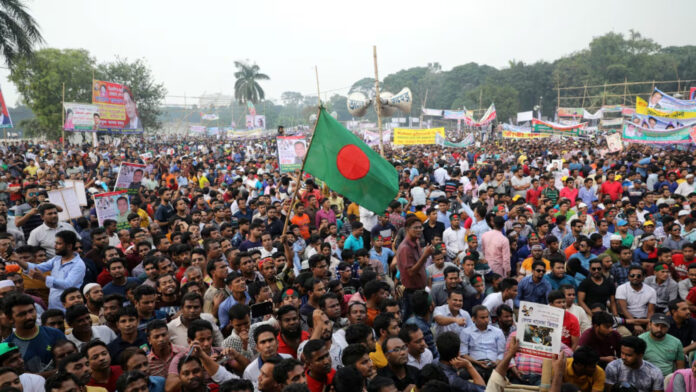True or not, in every other South Asian country, including India, prevailing perceptions indicate that foreign policy is increasingly being driven by domestic politics and popular expectations, especially during poll time
N Sathiya Moorthy
8 January 2024
Beginning with Bangladesh on Sunday, 7 January, South Asia will be in election-mode through the coming weeks and months. Bangladesh will be followed by the second round of general election in Bhutan, and that in Pakistan on 8 February. Nepal is the only exception in South Asia as India and Maldives will have their parliamentary polls in the March-May window, followed by the crucial presidential elections in Sri Lanka, where President Ranil Wickremesinghe is considering the dissolution of Parliament a year ahead and ordering fresh elections.
Ironically, it is only in Pakistan, which had fashioned its post-Independence/post-Partition politics on a Kashmir-driven, India-centric approach where no one is talking about foreign policy as a main element in the elections this time. True or not, in every other country, including India, prevailing perceptions indicate that foreign policy is increasingly being driven by domestic politics and popular expectations especially during poll time.
In Pakistan, ironically, ending adversity with India is an unsaid under-current in domestic politics after the nation was gripped by an unprecedented economic crisis a couple of years back. This has become possible with an increasing awe at the growth and development in India since the nineties. At the time, Pakistani critics of India and also the general public were viewing India as a ‘gone case’, owing to the unprecedented and unexplained fiscal crisis.
Today, the Pakistani army that does not lose any opportunity to capture power in the face of domestic political crises in the past has shied away from staging a coup. One, it does not know how to handle the economy just now. Two and equally important, Western nations and their creations like the IMF and the World Bank shy away when it comes to dealing with a non-democratic/un-democratic nation when it suits their larger geo-politics.
China, to whose apron strings Pakistan had tied itself in knots in the past, too, is not ready to exploit the current economic/domestic situation in that country. Or, so it seems. Pakistan’s appetite for foreign aid has been so huge all along but during the Cold War and post-Cold War years, the US on the one side and an ‘independent’ and emerging China saw it as a geo-strategic investment against India.
In fact, after the sly China visit of US President Richard Nixon by using his Pakistan visit as a launch-pad, less than two months after India’s successful conduct of the ‘Bangladesh War’ in December 1971, gave the impression that the two nations were sort of coordinating aid to India’s adversarial Western neighbour. That was a great moment in India’s foreign and security policy that the US could not stomach and China was unable to live with.
Now, there is a silent prayer in most Pakistani mouths and hearts for a new government in Islamabad building bridges with India, not necessarily to mend ties on what to them is still a contentious Kashmir issue. Instead, they seem to believe that by befriending India and observing India’s growth strategy and implementation, their nation stands to learn the trick, and implement it after tweaking it to local needs, strengths and weaknesses.
As their understanding goes, India, like Pakistan and other nations that had collapsed under its own economic weight, too took the IMF route for restructuring the economy – and succeeded. It implies a strong domestic input that is Indian/South Asian in character from which Pakistan has to learn.
If the change-of-mind at the street-level in Pakistan is a cause for smug satisfaction in India in terms of bilateral relations in the immediate future, the unexplained elimination of anti-India terror leaders in that county, one after the other, in recent months may be an added factor that could influence New Delhi’s approach to Pakistan in the months and years after elections in that country. Unlike in Pakistan, India’s Pakistan policy is not going to change even if there is the unlikely event of a new government in India in the Lok Sabha elections this summer.
One-woman democracy
The same cannot be said about India’s Bangladesh neighbour in the east. New Delhi has been facing a unique problem here as has belonged to its post-war Western friends and allies. Over the past 10-plus years, where India too faced a change-of-government, New Delhi has been forced to use ‘democracy’ as a foreign policy tool in the neighbourhood but selectively so.
Thus, New Delhi has steadfastly worked with the government of Prime Minister Sheikh Hasina in Bangladesh but described the erstwhile regime of jailed former President Abdulla Yameen in Maldives as ‘undemocratic’. Today, Yameen is no longer in power, but Hasina is. Pitted against her, if at all, are Islamic fundamentalist elements after the mainline Opposition Bangladesh National Party (BNP) has once again decided to boycott the election.
The BNP had contested the previous general election and lost very badly. At the time, insiders claimed that its decision to boycott the previous polls had voluntarily shut its voice where it mattered the most, namely, Parliament. While another boycott could reinforce it even more this time, there is concern in Western capital about the increasing solidification of a ‘one-woman democracy’ in Bangladesh, which shares a border with Myanmar, where the military junta recaptured power in February 2021 after a brief honeymoon with electoral democracy.
Shaded in confusion
Talking of Myanmar, New Delhi will be keenly watching the civil war flowing across the Chinese border as a missile fired from within the country fell in a Chinese border town, injuring many people. The current belief is that China continues to arm both the junta and the three-group militia, as it used to do in the case of Sri Lanka in the past, where it was supplying weapons to the LTTE and fighter jets and other ammunition to the government troops. At least, there were reports about the government troops recovering LTTE fired shells with Chinese markings.
Thus, going beyond Pakistan and Bangladesh, the Indian concern in other South Asian nations going to the polls is also about the pro-China tilt of some or the political parties in each one of them. In Bhutan, the incumbent government has already lost in the first poll. Whoever between the two main contestants win, the Indian interest lies in the future course of the Bhutan-China border delimitation, initialled last year by the outgoing government.
In the case of Bhutan, there is no mention of either of the key contestants in round two being overly pro-China and more so, anti-India. That is not the case with Maldives, where the recently-elected President Mohamed Muizzu started off at a disadvantage in the eyes of the strategic community and the media in India, both of which are squarely ill-informed. The same cannot be said to be the perception of the government, which would however shape up only in the future, depending on how much and how far does Muizzu moves away from India, if at all, and how much and how close he gets to China, in key parameters of bilateral interests to New Delhi.
The Maldivian parliamentary election in the summer is not going to be fought on a foreign policy plank as elsewhere. However, Muizzu’s poll promise to remove 89 Indian troops engaged in emergency evacuation and aerial reconnaissance for drug-smugglers and other international criminals will hang in the background, as his own constituency from the presidential poll victory. It will be seen as his strength, understanding and acceptance of/in international diplomacy, which do weigh with urban sections of the Maldivian voters.
Unlike Maldives, India’s concerns about common neighbour Sri Lanka’s tilt away from the country and towards China are shaded in confusion for no fault of New Delhi. Successive Sri Lankan governments and their leaders have made a fine art of sending out confusing and contradictory signals to India on the China front.
This is true not only of incumbent President Ranil Wickremesinghe and the Rajapaksa leadership of the ‘ruling’ SLPP in Parliament, whose continuous support alone has kept the government going – and hopefully so until presidential polls this year.
Wickremesinghe has also planned to dissolve Parliament earlier by a year and order fresh elections. It means that the nation, government, parties and the public will be tied down to the twin elections. From an Indian stand-point, even the main Opposition SJB under presidential hopeful Sajith Premadasa has not warmed up enough to India though their approach to China, like those of others, show up only when in power.
Less said about the left-leaning JVP the better. Party leader Aunra Kumara Dissanayake, AKD, is the supposed front-runner in the presidential poll just now. While not necessarily seen as being pro-China per se, the party and leader are slowly but not steadily warming up to India, the US and even the IMF, all of them their hate-objects until before the unprecedented economic crisis that hit the nation in 2022. Whether it will remain so and prosper or is only a tactic for a JVP government to continue with the nation’s palpable China tilt as at present is a million-dollar question.
Cautious optimism
The Indian strategic community needs to look as much at the religious element in the foreign policy tilt of neighbouring countries viz New Delhi as their pro-China bias, real and surreal. Of the eight SAARC member-nations in South Asia, four, namely, Afghanistan, Bangladesh, Pakistan and Maldives, are Islamic. Under the Taliban regime, Afghanistan remains as radicalised as before the post-9/11 US-facilitated ‘democratic regimes’ of Presidents Hamid Karzai and Ashraf Ghani.
Against this, Pakistan seems wanting to come out of the anti-India mind-set, to which Islamic radicalisation of the armed forces since the days of military-President Zia-ul-Haq in the late seventies. It looks as if the nation still lacks the will to do so. With the result, even if a post-poll government in the country, possibly led by three-term Prime Minister, Nawaz Sharif, returns to power and also warms up to India, New Delhi’s approach will be one of ‘cautious optimism’.
So is the case with Maldives, which still remains the most moderate of Islamic nations in South Asia, alongside Bangladesh. However, the religious scholarship attaching to President Muizzu, who otherwise is a qualified civil engineer with a PhD in structural engineering from a British university, and his late father’s Salafi background, which his brother-in-law has taken over, has made the regime a suspect in the eyes of moderates, both in the country and outside.
The larger question is what after this year’s elections in the neighbourhood nations? In the absence of effective democratic Opposition in Bangladesh and Pakistan, the role may pass on to religious fundamentalists with their strident anti-India messaging that does suffer from any religious rationale. The reason is obvious.
Stronger and more powerful Islamic nations in West Asia, including Saudi Arabia, the keepers of Islam’s most important pilgrim-centres, Mecca and Medina, and also those like the UAE, have absolutely no problem with India’s ‘Hindutva’ regime, if it is one. The question is if New Delhi can proceed with the perception of friends in West Asia as that of ‘true Islam’ towards India and can afford to ignore radicalised neighbourhood views?
It is as much an important issue for India to study afresh and sort out as China’s presence in the neighbourhood is. Both will remain more or less the same even if there is a post-poll change of governing political ideology in India – which however remains remote at the moment and possibly beyond.
(The writer is a Chennai-based Policy Analyst & Political Commentator. Email: sathiyam54@nsathiyamoorthy.com)





